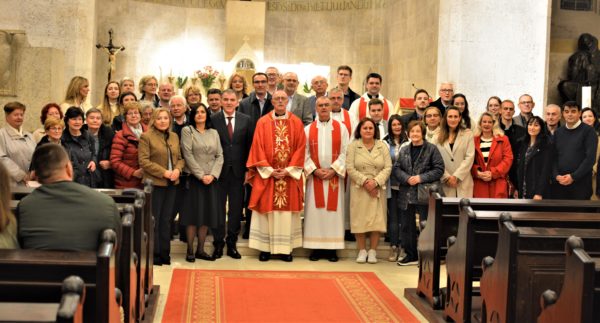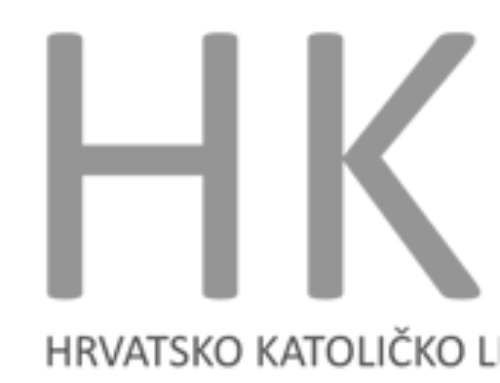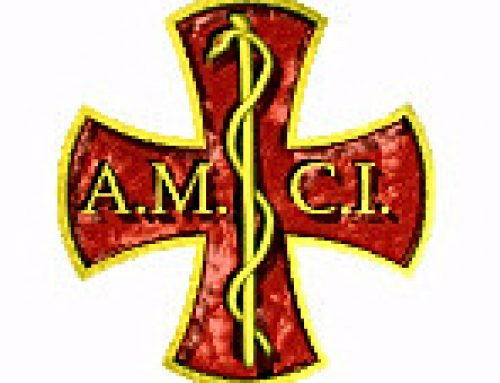Zagreb: Celebration of the feast of Saint Luke, the patron saint of the Croatian Catholic Medical Society
With the customary three-day program, the members of the Croatian Catholic Medical Society (HKLD) celebrated the feast of Saint Luke the Evangelist, the patron saint of the Society.
The celebration was preceded by two-day spiritual retreats this year dedicated to missionary pastoral care. On the first day, sister Ivana Margarin, FDC, the national director of the Pontifical Mission Societies in the Republic of Croatia, an institution that coordinates missionary pastoral care in Croatia, and supports the activities of missionaries in poor and underdeveloped countries of Africa, Asia, South America and Oceania. In addition to evangelization and the establishment of new Christian communities, missionaries help in the development of the local community, mainly supporting education and healthcare. Therefore, since doctors and other healthcare workers are very important participants in the missionary work, HKLD should consider more intensive involvement in the organization and implementation of missionary activities in Croatia. In the presentation entitled “Passion in missionary work”, sister Ivana emphasized the importance of missionary activity in poor countries, especially those that do not know the Gospels where Christianity is accepted even faster and easier. However, she also pointed out the new trend of the need for missionary pastoral care in the developed countries of Europe and North America, where re-evangelization needs to be carried out due to the pervasive alienation of the Western world from God and it’s distancing from Christian roots.
On the second day, colleagues from Slovenia joined us with presentation “Slovenian missionary volunteer expedition: India 2024”, presented by mag. sc. Marija Leskovec, prof. of pedagogy, lay missionary from Ljubljana, Rev. Primož Lorbek, mag. of theology, pastor of the Maribor University Parish, assistant. sc. Simona Kovačec, MD, specialist in family medicine, and Niko Mlinarič, a third-year student at the University of Maribor School of Medicine. They presented their experiences from the 2024 mission in India, when they visited the headquarters of the Missionaries of Charity in Calcutta and other houses where care for the most vulnerable and poorest members of society is provided, including the dying. Rev. Lorbek presented his pastoral work in the unique University Parish, which gathers all the students of the University of Maribor, since a university chaplain cannot be appointed and be active within the University, so he works outside the University. This year, they added to their pastoral ministry a missionary work, in which medical students expressed substantial interest, inspired by mag. Leskovec who has been in various missions in India 15 times.
On the feast of St. Luke, on October 18, members of the HKLD gathered in St. Mark’s Church in Zagreb where Archbishop Giorgio Lingua, Apostolic Nuncio in Croatia, celebrated the mass for Catholic doctors, in concelebration with Prof. Ivan Bodrožić, ecclesiastical assistant of the HKLD, Prof. Jerko Valković from the Croatian Catholic University (former ecclesiastical assistant of the HKLD Branch in Rijeka) and Rev. Tomislav Hačko, head of the Press Office of the Archdiocese of Zagreb.
Msgr. Lingua addressed the assembled members of the HKLD in Croatian, thanking for the kind invitation to preside this celebration. In his homily he highlighted four aspects of St. Luke’s writings that can be a source of inspiration for healthcare workers: faithfulness to the mission, seriousness in the work, attention to the least and community building.
You can read the entire homily at the link: https://ika.hkm.hr/novosti/homilija-nuncija-lingue-na-misi-za-katolicke-lijecnike/?fbclid=IwY2xjawGCDNhleHRuA2FlbQIxMAABHcNLxK18fcYqakXV-tABvLogYcI-zdbczWUzwxT6WCpvoLNpyEHaTtjgTQ_aem__b2UWinpHybRYkrpujHa Jg
At the end of the holy mass, Prof. Rok Čivljak, president of the HKLD, addressed the audience, congratulating to the members of HKLD the feast of their patron saint and thanking everyone who participated in this celebration: the soloists and members of the Cantores Sancti Marci Oratorio Choir led by the organist Prof. Pavao Mašić, members of the Youth Section of the HKLD for the readings as well as everyone who participated in the preparation of this celebration. Special gratitude was expressed to the Apostolic Nuncio Msgr. Lingua, on leading this eucharistic communion and delivering the teaching words of support to all healthcare professionals – followers of the teaching of Christ whose life was forwarded to us though writings of our patron saint St. Luke, a physician himself, but also the author of one of the four Gospels and the Acts of the Apostles.
After the holy mass, members of the HKLD continued socializing with the guests in the parish hall, where they celebrated the birthdays and name days of as many as five members of the HKLD.
Source: https://www.hkld.hr/zagreb-proslava-blagdana-svetog-luke/
Homily by Archbishop Giorgio Lingua, Apostolic Nuncio in Croatia, at the Mass for Catholic Doctors
The homily of the Apostolic Nuncio in the Republic of Croatia, Archbishop Giorgio Lingua, which he delivered at the celebration of the feast of Saint Luke, the patron saint of the Croatian Catholic Medical Society, on October 18, in St. Mark’s Church in Zagreb.
Readings: 2 Timothy 4:10-17; Psalm 144; Luke 10:1-9
Dear brothers and sisters in Christ,
I thank you for the kind invitation to preside the celebration of the feast of your patron saint: Saint Luke the Evangelist. I would like to highlight four aspects of St. Luke’s writings that can be a source of inspiration for all the healthcare workers: faithfulness to the mission, seriousness in the work, attention to the least and community building.
1. Faithfulness to the Mission
Luke is the only one with me.
In the first reading, we listened to St. Paul who, in a moment of great suffering, confides in his friend Timothy that he feels lonely. Some left him, like Demas, on whom Paul strongly relied: he preferred to return “to the world”, to Thessalonica. Christian life was too demanding for him.
The other, Alexander, not only left, but caused a lot of harm to Paul, who feels obliged to warn his friend Timothy: don’t trust Alexander, he is evil, he is bad, he can harm you too. The others went on missions: Titus to Dalmatia, Crescentius to Galatia, Tychicus was personally sent by Paul to evangelize in Ephesus.
In that painful situation, due to betrayal and estrangement, Paul can still count on a faithful friend: Luke is the only one with me. Celebrating the feast of Saint Luke, we want to celebrate faithfulness to the mission. Not only mission in the strict sense, the evangelistic one, but every mission, like yours, in the field of healthcare.
Luke is an example of a person who remains faithful, especially in difficult moments when we want to abandon everything and indulge in discouragement.
When therapies do not give any results, relatives expect miracles, you feel helpless… In those moments, it is important to have someone you can confide in, with whom you can share the difficulties of your mission. Know how to carry each other’s burdens, and not turn the other way. This is Luke’s first lesson.
2. Seriousness in the Work
As you know, among the four evangelists, Luke is the only one who did not meet Jesus. He was a doctor by profession, and his hobby was historiography. That is why, perhaps at the request of St. Paul himself, he did a careful research to document the sensational things that were said about Jesus.
He himself, at the beginning of his Gospel, writes: Since many have undertaken to compile a narrative of the events that have been fulfilled among us, just as those who were eyewitnesses from the beginning and ministers of the word have handed them down to us, I too have decided, after investigating everything accurately anew, to write it down in an orderly sequence for you, most excellent Theophilus, so that you may realize the certainty of the teachings you have received (Lk1:1-4).
Luke worries about the fact that some believe, but without deepening their faith. If this continues, he believes there is a risk that what is taught about Jesus will soon become like one of the many mythological stories that were told in the Greek world to explain the mystery of life. They were beautiful, interesting, instructive, but they cannot be identified with the revelation brought by Jesus.
It should be known that what is said about Jesus is historically based, not just fantasy or natural wisdom and cannot be confused with legend.
For this reason, it is necessary to document everything. Do not limit yourself to what has been heard. It was precisely for this reason that Luke went to consult with the Mother of Jesus, so that today we can consider him Mary’s evangelist.
Only he gave us the account of the annunciation, the visitation, the scenes of Christmas and the appearance of Jesus in the temple.
Therefore, Luke’s second lesson is: professionalism, which includes information and in-depth analysis. How important it is in the field of medicine, especially today.
3. Attention to the Least
In his historiographic editing, Luke leaves a clear stamp of his profession. As a good physician, he was, in fact, interested in the suffering of humanity and tried with special care to adopt the feelings of Jesus’ heart towards those who suffer.
Doctor Luke knew very well how important closeness with the patient is. Perhaps this is the reason why he emphasizes the mercy of Jesus more than any other evangelist, even though he did not know Jesus personally and therefore did not personally experience his mercy.
Luke is the one who brings us the parable of the prodigal son, a treasure we find only in his Gospel, as well as the feelings of the woman who lost and found her drachma again.
Only the evangelist Luke tells us the parable of the Good Samaritan and speaks about Jesus’ love for the poor in much gentler tones than the other evangelists: he shows us the Lord who was moved by the better widow of Nain; who with special attention receives the sinner in the house of the Pharisee Simon and assures her of God’s forgiveness; who receives Zacchaeus with such kindness that he changes his greedy heart of the publican into a contrite and generous heart.
How important it is that the mission of the Catholic doctor is inspired by the feelings of the heart of Jesus!
What Pope Francis said when meeting with doctors, nurses and health staff of Lombardy, the Italian region that was hit hard by COVID-19, is touching. The Pope emphasizes, moreover, glorifies their ability to be close to the sick as persons who suffer together with them.
I quote the Holy Father: In the whirlwind of an epidemic with shocking and unexpected effects, the reliable and generous presence of medical and paramedical staff represented a safe support, above all for the sick, but in a truly special way also for their families, who in this case did not have the opportunity to visit their loved ones . And so, in you, healthcare professionals, they found other members of the family, people who are able to combine professional expertise with the attention that is a concrete expression of love. Patients often felt that they had ‘angels’ with them who helped them heal, and at the same time comforted them, supported them, and sometimes accompanied them to the threshold of the final meeting with the Lord.
This description is beautiful. It is the image of a Catholic doctor, who treats the patient in his entirety, in a holistic way, as they say, looking at the patient as a whole of body, mind and spirit, and aims to treat the person as a whole, not focusing only on symptoms or individual parts of the body.
The Holy Father then continues with his praises, he is so amazed by the doctors in the time of COVID-19: These health workers (…) testified to God’s closeness to those who suffer; they were silent masters of the culture of closeness and tenderness. (…) And you were witnesses to it, even in a small way: in a caress…, maybe through a mobile phone, connecting that old man – who was tired – with his son and daughter so that they could say goodbye, so that he could see them for the last time…; small gestures of creativity and love… It did us all good.
Acting in this way, these doctors did not limit themselves to performing their profession, but carried out their mission.
Archbishop Vincenzo Paglia, president of the Pontifical Academy for Life, meeting last May with the promoters of the “Thank you, doctor!” campaign, a global initiative that seeks to improve the humanizing role of general practitioners, said: It is really important to rediscover the relationship between doctors and the patient as the heart of medicine. Medicine cannot be reduced to prescriptions or technologies, no matter how sophisticated they may be, because men and women can never be perceived solely on the basis of their illness.
A thought that the Pope repeated two days ago during a meeting with members of the Italian Surgical Society, to whom he said, among other things: Modern medicine sometimes focuses more on the physical dimension of man, instead of seeing him in his wholeness/totality and uniqueness.” “By doing so,” continues the Holy Father, “the body becomes a bare object of scientific research and technical manipulation, to the detriment of the patient, who falls into the background.” But science is at the service of man, not man at the service of science!
Here is another lesson from Saint Luke the physician: closeness and sensitivity to other people’s pain, especially the least.
4. Building the Community
Finally, Saint Luke is considered an evangelist of trust, peace and joy. And these are the fruits of the Holy Spirit.
Luke is the one who in the Acts of the Apostles describes the descent of the Holy Spirit on Pentecost, which transforms the frightened apostles, imprisoned in their own failure, into brave, free and strong people.
A group of people who did not understand each other and were about to split up, leaving Jerusalem disappointed, was transformed into “one heart and one soul”, capable of witnessing and spreading the joy of the Gospel.
Luke is the one who coined this beautiful expression “one heart and one soul”, also taken from the Congregational Prayer of today’s Mass: Lord our God, you chose Saint Luke to reveal the mystery of your love for the poor. Let the Christians, who are proud of your name, remain one heart and one soul and all nations see your salvation.
Unity, joy, peace are gifts of the Spirit that become contagious and spread faith with their attraction.
Taking care of health is very important for creating happy people. When someone is struck by pain, it is no longer possible, unless he is a hero, to smile and kiss. He closes in on himself. By restoring health, the doctor helps to create the foundation of a healthy, joyful community, bearer of the good news.
When someone recovers, especially after a serious illness, he rediscovers the meaning of life and gratitude and realizes that everything is vanity, and then focuses on what is important, especially interpersonal relationships.
Not only is the disease eradicated, the metastases that multiply, but the germ of joy and love is injected. The health of the body often leads people to reconciliation, they realize that they were fighting over insignificant things, and a positive contagion begins.
It is interesting that only Luke reports on the sending of seventy-two disciples on a mission: After that, the Lord appointed other seventy-two disciples and sent them two before him to each city and to each place where he intended to go.
St. Gregory the Great is obviously the first to say why he sends them two by two: Disciples should be messengers of Christ’s love.” If there are not at least two, love is not possible, because it is not done towards oneself, but towards another. The testimony of love is what is contagious, because it attracts.
I also want you to be messengers of Christ’s love, injecting the seeds of goodness into your patients.
I wish that patients, in addition to your expertise, also admire your contagious humanity!









